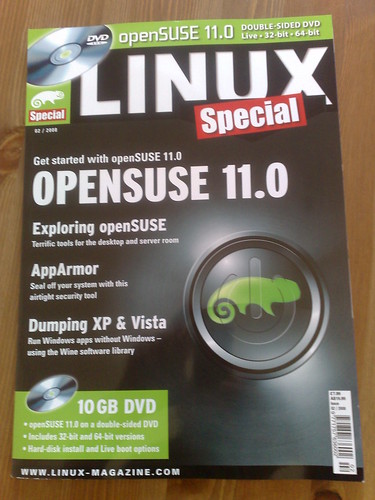So LUG Radio Live UK is over for another year, yes the event will be back next year but not the podcast. openSUSE were represented by yours truly and Roger Whittaker (also representing the Big N), and to be honest I didn’t have to get my baseball bat out once to get people to come by – I was slightly disappointed with that as knocking some sense into some of those Ubuntu zombies would have been fun 😛 Part of the reason may have been the fact that the Furry Geekos were out in force

Roger also did a sterling job of getting the new openSUSE 11.0 Live/Installable DVD into almost all the “NutSacks” (The bags attendees received when entering the event). Those that didn’t get one in there pretty quickly came over to ensure they did get one. Everyone agreed that we had the best mascot and the best swag, talking of which can anyone guess what this is?

Only a few folk were lucky enough to get one, and to be honest it is a much better one than what RedHat/Fedora were dishing out. It is of course a USB stick

Another piece of openSUSE swag that was being dished out but not by us was the Linux Magazine openSUSE 11.0 Special. This is actually quite a good issue and is a great companion for anyone new to the distro. I have a couple that I can send to people (UK/Europe preferably due to cost) if requested. The issue was created aimed predominantly at the US market where Linux Magazine is trying to get a foot hold:

Wandering around, I spoke to quite a lot of people about Linux in general and openSUSE and the feedback from people was tremendous. Those that have actually tried 11.0 really really like it, and those that haven’t were adamant that they would. So much so that one rather intimidating chap mentioned that “A friend of mine needed to re-install her machine and she was very scared of the process, I gave her a DVD of 10.3 and told her to ring me if she was stuck. She rang me a short while later and exclaimed at how easy and straight forward it was. She hasn’t looked back since!” The praise also came from a fair few die hards of other distros, which was pleasant to see and hear. There was a friendly swag exchange with RedHat and Fedora, although their offering was pretty poor in comparison but still better than Ubuntu who had nothing but a type of crummy sticker and a million and one CDs of assorted variants of the same crud 🙂 The Fedora guys took it upon themselves to try and sully the image and spirit of our beloved Geeko by hanging it by one of their lanyards

Thankfully the kind chaps from Debian rescued it, although I’m pretty sure it was for their own gains. The atmosphere was light hearted and pleasent with no trolls in sight or in earshot. This even extended to my lightning talk which was pretty well attended, around 30 people almost none of which were involved with openSUSE in any way. You can get my slides here, and there will be a video of it shortly.
All in all it was a fairly good weekend, and from an openSUSE perspective a very productive one 😉 I would like to thank Roger for his hard work in doing the stand, helping out and support as well as for the photos (some of which I used here). I would also like to thank Zonker and Novell for arranging for the brilliant swag and DVDs, without which we could have looked like dull dorks. Till next year!